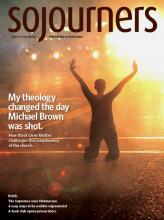“WHAT YOU do to children matters. And they may never forget.”
This thread runs aggressively through Toni Morrison’s most recent novel, God Help the Child. The speaker is Sweetness, a woman who shares her family’s wounds from trying to pass for white, or “high-yellow,” for generations. Of trying to blend in well enough to drink at fountains, to try on hats in stores, to use the same Bible as whites during ceremonies. When her child and the novel’s focus, Bride, is born black, “midnight black, Sudanese black ... blue-black,” all the advancement Sweetness and her ancestors strove for dies. She loses her husband (who assumes she has been unfaithful), her social standing as a light-skinned woman, and any love for her child. “Her color is a cross she will always carry,” Sweetness says. “But it’s not my fault. It’s not my fault. It’s not my fault. It’s not.”
Bride grows up without the love of a mother’s touch and scorned for being so oddly dark, until she learns to use her color to make herself exotic and marketable. What may seem to be a character living into her identity as a black woman is really a façade in order to regain what was lost because of her skin. Of course, what Bride sees as progress is actually proof that she too has fallen into Sweetness’ obsession with what Morrison described in a recent NPR interview as “skin privilege—the ranking of color in terms of its closeness to white people or white-skinned people and its devaluation according to how dark one is and the impact that has on people who are dedicated to the privileges of certain levels of skin color.” But while race and color as social constructs are themes in the book, they are not explored as deeply or given as much emphasis as childhood trauma.
As in some of Morrison’s other novels, magical realism conveys the battle between the past and the present, the spiritual and the physical, playing a poignant, visceral part in Bride’s journey. Bride goes through a literal metamorphosis, assuming it is penance for gruesome choices she made as a child to feel alive and as an adult to feel powerful. She is numbed to what true progress and success are, constantly trying to put a fragmented identity together until she can no longer get up and must face her trauma and changing body.
The only people in the novel who allow themselves to truly heal are a child named Rain and an ex-convict named Sofia. They speak to the power of self-forgiveness. Too often we carry the shame and hate handed to us by other people’s evil, whether from childhood trauma and abuse or complacency and apathy as adults. While we can and must be held accountable for our own mistakes, we must also be willing to take off the shroud of self-loathing and guilt, and move forward past trauma into self-acceptance and healing. Both Rain and Sofia, young and old, can see the power of blame and regret and refuse to walk that path, while Bride, her lover Booker, and her mother Sweetness will arguably always drag the sins of their forebears behind them.
“What you do to children matters. And they may never forget.”
Read the Full Article

